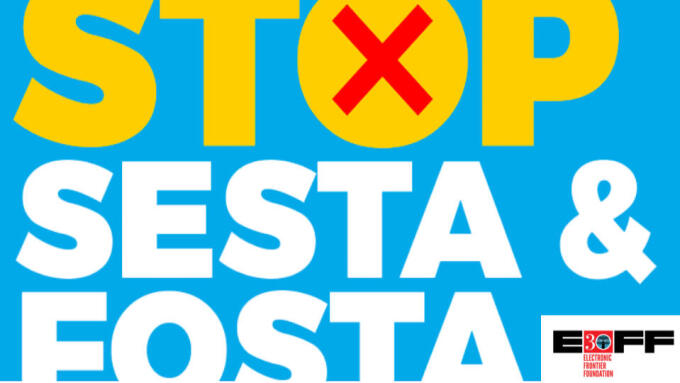SAN FRANCISCO — Electronic Frontier Foundation (EFF), the leading digital rights advocacy nonprofit, released yesterday a comprehensive report praising the Woodhull Foundation’s ongoing lawsuit challenging the constitutionality of FOSTA-SESTA legislation.
FOSTA-SESTA was drafted by religiously motivated midwestern Republicans and sold to Democratic members of Congress — most famously to current Vice Presidential candidate Kamala Harris — as "an anti-human trafficking measure." In fact, since Donald Trump signed it into law in April 2018, FOSTA has had null-to-negative effect in the fight against actual human trafficking in the U.S.
It is widely believed, in fact, the stigmatizing legislation has made it more difficult for law enforcement to identify actual instances of human trafficking.
The EFF report, titled “Plaintiffs Continue Effort to Overturn FOSTA, One of the Broadest Internet Censorship Laws,” explores recent legal briefs filed in federal court recently, where plaintiffs Woodhull Freedom Foundation, Human Rights Watch, the Internet Archive, Alex Andrews, and Eric Koszyk “argued that the law violates the First and Fifth Amendments, and the Constitution’s prohibition against ex post facto laws.”
EFF, together with Daphne Keller at the Stanford Cyber Law Center, as well as lawyers from Davis Wright Tremaine and adult industry law firm Walters Law Group, represent the plaintiffs.
The article explains FOSTA’s “comprehensive censorship” by summarizing its most egregious effects:
- FOSTA creates a new federal crime for any website owner to “promote” or “facilitate” prostitution, without defining what those words mean. Organizations doing educational, health, and safety-related work, such as The Woodhull Foundation, and one of the leaders of the Sex Workers Outreach Project USA (SWOP USA), fear that prosecutors may interpret advocacy on behalf of sex workers as the “promotion” of prostitution. Prosecutors may view creation of an app that makes it safer for sex workers out in the field the same way. Now, these organizations and individuals — the plaintiffs in the lawsuit — are reluctant to exercise their First Amendment rights for fear of being prosecuted or sued.
- FOSTA expands potential liability for federal sex trafficking offenses by adding vague definitions and expanding the pool of enforcers. In addition to federal prosecution, website operators and nonprofits now must fear prosecution from thousands of state and local prosecutors, as well as private parties. The cost of litigation is so high that many nonprofits will simply cease exercising their free speech, rather than risk a lawsuit where costs can run into the millions, even if they win.
- FOSTA limits the federal immunity provided to online intermediaries that host third-party speech under 47 U.S.C. § 230 (“Section 230”). This immunity has allowed for the proliferation of online services that host user-generated content, such as Craigslist, Reddit, YouTube and Facebook. Section 230 helps ensure that the Internet supports diverse and divergent viewpoints, voices, and robust debate, without every website owner needing to worry about being sued for their users’ speech. The removal of Section 230 protections resulted in intermediaries shutting down entire sections or discussion boards for fear of being subject to criminal prosecution or civil suits under FOSTA.
The EFF report also includes a description of the current plaintiffs and their standing.
To read “Plaintiffs Continue Effort to Overturn FOSTA, One of the Broadest Internet Censorship Laws,” visit the EFF website.







